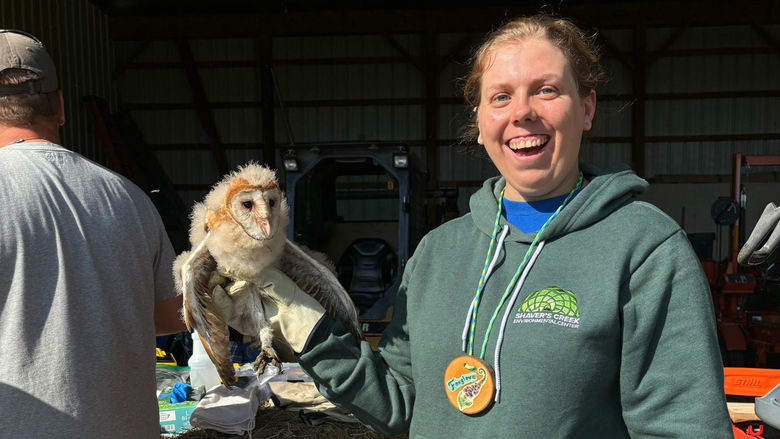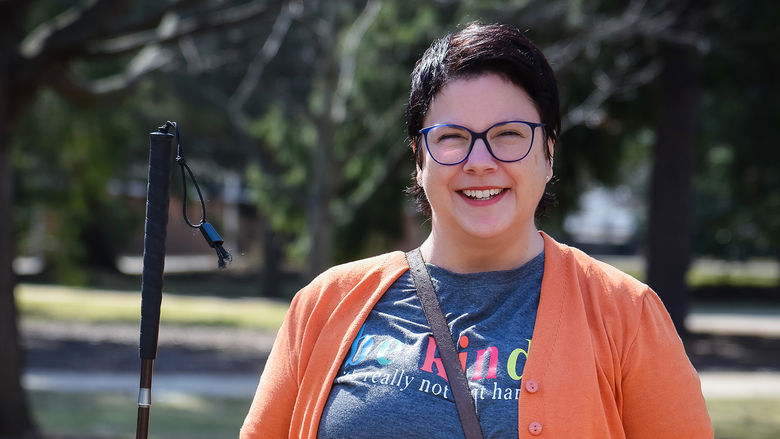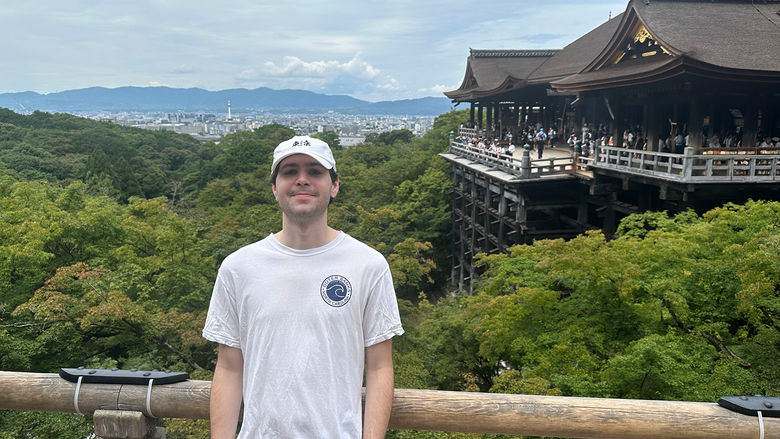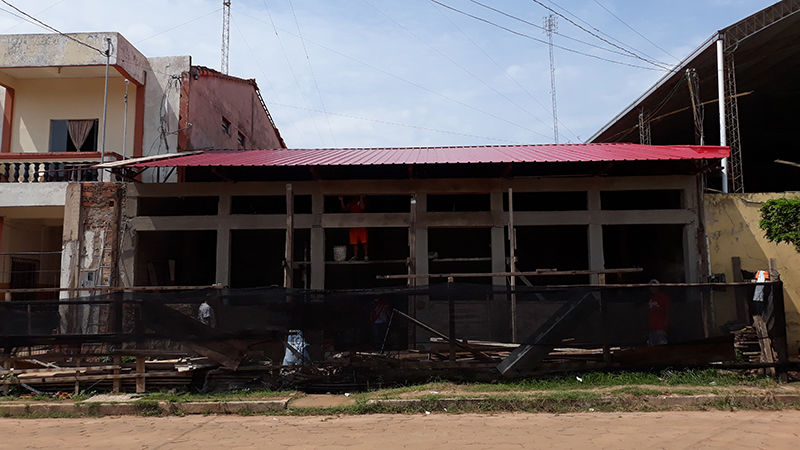

This dialog contains the full navigation menu for this site.

A summer 2018 Ivy Leaf article featured an Enactus business project taking place in Bolivia. As that project moves forward, it has led to exciting new opportunities for Penn State Altoona students.
Over spring break 2018, six Penn State Altoona students traveled to Guayaramerín, Bolivia, in partnership with Love in Action International Ministries (LIAIM). LIAIM is a non-profit organization located in Altoona that operates Andrea's Home of Hope and Joy, dedicated to rescuing orphaned, abandoned, abused, and extremely poor children in Latin America.
Andrea’s Home hosts mission trips, which typically include construction projects, maintenance, daily chores, and playtime with the children. Last March, the six students and two faculty members traveled to the orphanage through Enactus, Penn State Altoona’s student social entrepreneurship organization. Using their business and entrepreneurial skill sets developed through classes and Enactus, students worked hard to create a lasting benefit to the orphanage and its children.
So, what’s next for the project, and where do Penn State Altoona students fit in with it now?
Preparation for the trip over spring break began in the fall 2017 semester. Orphanage leaders were interested in building a coffee shop near the city center, and Enactus students were tasked with finding out if the project would be feasible and sustainable. They began by researching everything from the target audience to marketing, cost, and traffic flow. They spoke with Altoona coffee shop owners for advice and insight and made list upon list of questions to investigate once they arrived in Guayaramerín. One glaring challenge they discovered through a competitive analysis was that there were already five similar businesses within a six-minute walk of the proposed site. Students wondered if it even made sense to open yet another one.
But once they laid eyes on the children living at Andrea’s Home, they were dedicated to figuring out how to make it work. “The kids just walk up to you and love you and accept you even though they've never met you before,” says Elissa Calhoun. “They immediately treat you as if you're family.” “The students’ passion for the orphanage and project skyrocketed when they met the kids and saw how their lives would be impacted through the shop,” states Cynthia Wood, who was the Enactus adviser at the time.
Most of the profit from the business will be a sustainable income for Andrea’s Home. Beyond that, it would give working-age children from the orphanage an opportunity to learn marketable skills and earn money through employment there.

The outside of Andrea's Café on its way to completion.
Enactus students hit the ground running, meeting every day to conduct market research, analyze the landscape of the area, and hold interviews with locals. They did a break-even analysis and completed a SWOT and situation analysis to identify the strengths and weaknesses of the business, then began building a marketing plan including financial information.
Melissa Kohler, instructor in business administration who also traveled to Bolivia, says, "Our students learn business theories and concepts in their classes, but this trip allowed them to apply that knowledge to a real-world project with real-world challenges. It offered a tremendous learning experience that will pay dividends for students in the future. In the process, they also are making a positive impact on our global community. It’s a win-win."
The group spent one full day doing a competitive analysis on the ground, scoping out what other local shops offered on their menus. It turned out that none of them offered coffee. “They call them coffee shops, but they really offer things like fruit drinks and milkshakes and snacks,” explains Wood. “So after a whole day, I asked the million-dollar question to the last coffee shop owner we spoke with, ‘doesn't anybody here drink hot coffee?’ The answer was no, and I was thinking, ‘oh my word, now what?’” “So we had to shift our project a little bit,” chuckles Calhoun. “We decided to make it more of a café with refreshing drinks, smoothies, and empanadas.”
Once back on campus, members finished and polished their plan, which included a diagram laid out in a computer-aided design and manufacturing program by an engineering student on the Enactus team. The detailed floor plan included tables, chairs, coolers, storage space, doors, windows, and traffic flow. The team also made recommendations with regard to a name and a logo. They presented it to the LIAIM board on April 16. The plan was accepted
A few days after that meeting, Enactus members made a discovery and a decision that would immediately influence the project and spur it toward fruition.
In 2016-17, Enactus received a $10,000 gift from Steve Sheetz, long-time philanthropic supporter of Penn State Altoona and its business and entrepreneurship programs. Enactus had been discussing how best to use this gift, wanting to invest it in a project that would make a sustainable impact. The gift from Sheetz would nearly cover the cost of the project. When presented with the idea, the Enactus executive board quickly voted to use the Sheetz gift for the café and presented Gary and Jerri Zimmerman, LIAIM founders and executive directors, with the check during a meeting that same week.
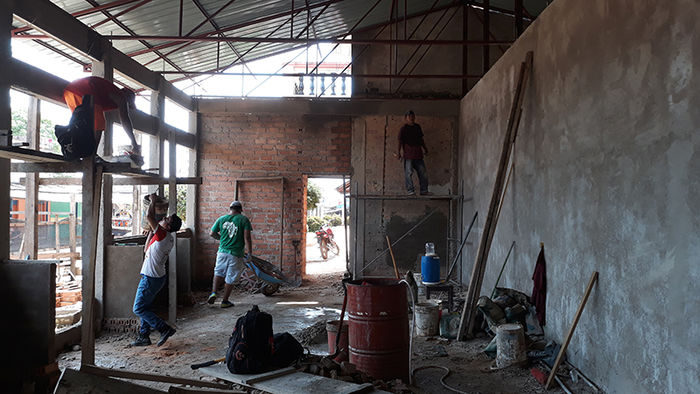
Workers tackle the inside of Andrea's Café.
Ground broke in July for Café Andrea. Greg Gorman, LIAIM board member and treasurer, says the building could be complete in March 2019 and open by mid-summer. “Without the students’ help, this project certainly would not have happened in the time frame that it did. They really laid the groundwork to get us across the starting line. I’ve been in construction all my life, so I’m used to seeing a lot of things come out of the ground, but to watch this project happen and know all that’s been behind it is a real sense of accomplishment and a real delight.”
In addition to housing over 100 orphans and operating a school that covers K-6th grade, Andrea’s Home also owns 230 acres of land that includes a small barn with six dairy cows and a fresh water source. While on the ground in Guayaramerín last spring, the team was able to visit the farm and began to discuss additional ways LIAIM can maximize the land and its natural resources to unlock the potential of the café and benefit the orphanage.
Possibilities include acquiring more dairy cows to increase milk production for the café and to sell around the city, the addition of beef cows, and creating an enterprise around fish. There is talk of constructing a water purification and bottling plant utilizing the natural spring on the acreage.The addition of a vegetable garden and chicken coop would supply many of the food products for the residents at Andrea’s Home with surplus sold in the café. There are also fruit trees, timber, and sugarcane on the land for use.
With this in mind, Wood and Kohler decided to create a for-credit research project for business students to write a land-use feasibility study. The students will analyze the Bolivian market, the market potential for each of the land/natural resources, potential revenue streams, and regulations that may impact the enterprises or land-use decisions. They will also look into Penn State grants and external funding sources. The students will travel to Bolivia over spring break 2019 to immerse themselves in the culture, inform their analysis of the land use, and gain additional understanding of Andrea’s Home of Hope and Joy. The result will be a recommendation report for LIAIM completed by May.
Students will develop their domestic and international business, teamwork, communication, and project management skills, as well as gain experience in business law and international consulting. But the project extends well beyond all of that. Team members will also be exposed to a new culture and learn flexibility, problem-solving, and how to adjust to a different society.
“This has the potential to be an incredible research project,” states Wood, who has stepped down as Enactus adviser. “I think there is an opportunity for students to make this very meaningful for themselves while giving back to a non-profit. The richness of it keeps growing.”
Three students were chosen from a pool of six based on their written and communication skills, motivation, and desire to make a meaningful impact. Once selected, they hit the ground running. Marcella Kishlock, a senior business major, says they will use the rest of the fall semester researching how to do a land-use study. Team members hope to have 99 percent of that research done by the time they travel to Bolivia over spring break. There they will see the orphanage, the land, and the café in person and conclude if their plans are feasible.
Kishlock says, “I like to put 100 percent effort into everything I do, and so do the other students on my team. If I can help the orphanage and give good ideas and insight into what can be done with the land, I know that I am helping the orphanage and the children who live there. I’m genuinely excited to be working on this project.”
Joey Hernandez is equally as excited about this opportunity. The senior business major says the research project is right in line with what he sees himself doing in the future. “I’m actually going to learn the process of performing a land-use study, and later on, if I ever want to open a business or help people manage their resources, I’ll have that background. I’ll be able to take that knowledge and perspective to so many people going forward.”
The work these students begin could continue well beyond the spring semester depending on what they accomplish and where the scope of the project may shift. Meanwhile, current Enactus members remain involved in the ongoing work of LIAIM. They are developing designs for the building’s “finish,” such as flooring, wall coverings, and a color scheme. They are also working on “fit-out,” or the layout for counters, signage, and furniture. Enactus offered a logo design competition open to all Penn State Altoona students. The winning design will be proposed to KIAIM for use on Café Andrea marketing materials and signs. The team will also continue to expand the marketing, branding, and social media for LIAIM, Andrea’s Home, and the café.
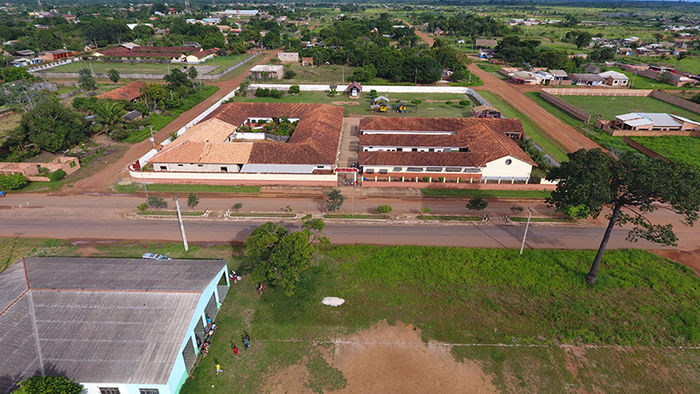
A drone picture of Andrea’s Home shows the four residences, the school, chapel, activity/dining hall, and playground with ballfields.
Each project Enactus undertakes and the new feasibility study course are providing more opportunities for students and more value for the orphanage. “I feel proud of the work we are doing because creating a social and economic change in the world is so important,” says Makayla Plants, Enactus’s project manager for the café and third member of the research team. “We are going to see this project through until the very end, and we would love to get more students from other majors involved. This doesn’t have to be just a business organization project.”
“It's so satisfying to see our students apply what they're learning in the classroom in a way that's making a sustainable difference for them and their world,” says Wood. “With this project, they are leaving a mark that won't soon be forgotten.”
“I’m really grateful for this opportunity,” adds Hernendez. “I hope that when I look back on my college career, this is a big part of my legacy. I’ll be able to say that I accomplished really great things in my time as a Penn State Altoona student. It’s the most fulfilling way for me to end my college career.”
